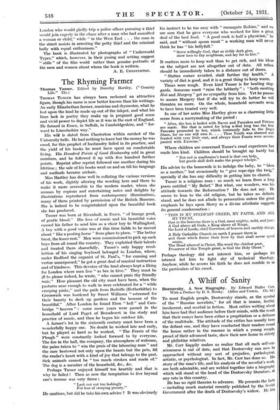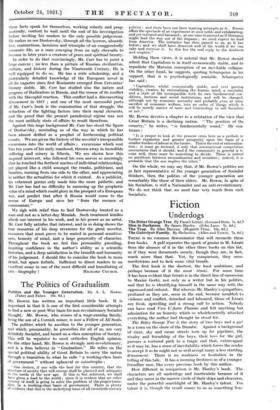A Whiff of Sanity
To most English people, Dostoevsky stands, as the symbol of the " Russian novelists," for all that is insane, lustful, incoherent, and morbid in fiction. Most critics writing about him have had that audience before their minds, with the result that their essays have been either a propitiation or a defiance of the multitude. The attitude of the critics has usually been the defiant one, and they have conducted their readers round the house rather in the manner in which a young couple, proud of their advanced taste, show their new home to elderly and philistine relatives.
Mr. Carr liappily makes us realize that all such self-con- sciousness is out of date, and that Dostoevsky can now be approached without any sort of prejudice, pathological, artistic, or psychological. In fact, Mr. Carr has done so. His story of the man's life, and his analysis of the novelist's work, are both admirable, and are welded together into a biography which will stand at the head of the Dostoevsky literature, at any rate in this country. He has no rigid theories to advance. He presents the facts —including much material recently published by the Soviet Government after the death of Dostoevsky's widow. He lets
these facts speak for themselves, working soberly and prag- matically, content to wait until the end of his investigation before inviting his readers to the only possible judgement. He makes us see Dostoevsky, through all the horrors, absurdi- ties, contractions, heroisms and triumphs of an exaggeratedly romantic life, as a man emerging from an ugly chrysalis to become in later years a creature of grace and spiritual beauty.
In order to do that convincingly, Mr. Carr has to paint a large canvas ; 110 less than a picture of Russian civilization, culture, and history during the Nineteenth Century. He is well equipped to do so. He has a wide scholarship, and a particularly detailed knowledge of the European novel in all its vagaries since first Rosinante emerged from Cervantes' literary stable. Mr. Carr has studied also the nature and progress of Radicalism in Russia, and the course of its conflict with the Slavophil reaction. This conflict had a disconcerting denouement in 1917 ; and one of the most successful parts of Mr. Carr's book is the examination of that struggle, the reduction of the fighting factors into their racial elements, and the proof that the present paradoirical regime was not the most unlikely state of affairs to result therefrom.
Against this huge background Mr. Carr has stood the figure of Dostoevsky, reminding us of the way in which he has been almost deified as a prophet of forthcoming political events. We are given the history of the novelist's irresponsible excursions into the world of affairs ; excursions which cost him ten years of his early manhood, thrown away in incredible suffering and misery in Siberia. We are shown how this inspired introvert, who followed his own nerves so unerringly that he touched the farthest reaches of individual relationships, yet played like a child amongst the cranks, politicians, and fanatics, running from one side to the other, and appreciating in neither the actualities for which it existed. As a publicist, his vehement genius only made him the more pathetic, and Mr. Carr has had no difficulty in summing up the prophetic value of a mind which could glory in the prospect of a European war, and predict that after it Russia would come to the rescue of Europe and save her " from the menace of communism."
We sigh with relief thus to find Dostoevsky treated as a man and not as a latter-day Messiah. Such treatment kindles afresh our interest in his work, and in his power as an artist. Mr. Carr fully satisfies that interest, and in so doing shows the true resources of his deep reverence for the great novelist, resources that must prove to he seated in personal sensitive- ness, honesty of mind, and a large generosity of character. Throughout the book we feel this personality presiding, inspiring confidence in the author's ability as a scientific historian, and a deep satisfaction in the breadth and humanity of his judgement. I should like to examine the book in more detail, but space forbids. Sufficient to direct readers to an excellent essay in one of the most difficult and humiliating of















































 Previous page
Previous page